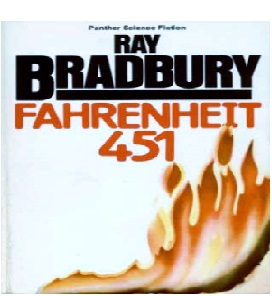Fahrenheit 451 has become something of a classic, not only for “hard-core” fans of Ray Bradbury, but among many others who see the world going down the path of doing away with the written word, lest it offend anyone. Sixty years on, what Bradbury saw the future as being – in spirit if not in the literal sense – does not seem too far-fetched in the age of Dumbing Down.
The action begins with Guy Montag, a “fireman” on the job, which is basically to hunt down, and burn, any books that may still be in existence. The very first line is “It was a pleasure to burn”, and Bradbury evokes a strong image, saying that he “strode in a swarm of fireflies”, and when he meets an unusual, and highly inquisitive, teenage girl on the walk home (walking home, in itself, is considered a suspicious activity), Montag furthers the anti-hero image by saying ““Kerosene is nothing but perfume to me.”
But it is not long before, through the girl’s persistence, he is given pause for thought and begins to wonder just why his job is of such vital importance. The first major indication of something gone amiss is when he has to take his wife home from the hospital, after she apparently attempted suicide, but is given drugs so that she has no memory of doing so. Realising that he and his wife may be less than content in their (allegedly) idyllic book-free existence, he begins to question everything more outwardly. But it seems that Montag is the odd man out in this case, from the robot Hound that blindly follows orders (“It doesn’t think anything we don’t want it to think”) to his colleagues, who are adamant that they are performing a public service (“Don’t give them any slippery stuff like philosophy or sociology to tie things up with. That way lies melancholy.”).
When his wife, and the mysterious young girl (also allegedly) disappear without a trace, and after a traumatic job assignment in which a woman is burned along with the books she tries desperately to hold onto, Montag decides enough is enough, and goes on the run in a quest for any literary knowledge, any “texture of information”, that may remain.
Bradbury, wryly and shrewdly, depicts a not-too-unrealistic world, in which books are seen as the enemy, rather than the ally, of the moral progress of human civilisation. Written not too long since a time when much book-burning was in fact taking place, Bradbury effectively draws attention to the notion that a totalitarian approach to the censorship of knowledge may lie in wait in the not-too-distant future.
